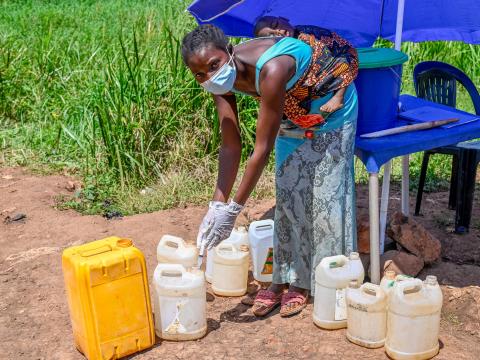DR Congo: Angèle, a Cholera Survivor: From Hospital Bed to Frontline Hero

Story collected by Tatiana Ballay, Communications Officer, World Vision
My name is Angèle Kayinda Mununga. I am 29 years old, married, and a mother of seven. I live in Kiminongo, Block Kabila 2, in the Dipeta neighborhood of Fungurume, Lualaba Province, Democratic Republic of Congo. I’ve served as a Community Health Worker (CHW) since 2019, long before cholera reached our area. I joined the RECO network with a clear mission: to help my family and community adopt healthier behaviors to prevent disease.
What I never imagined was that I would become a cholera patient myself. I am a cholera survivor
“I was sick. Very sick.”
The symptoms came suddenly, just three days after contact with my hairdresser, who was also unwell. The diarrhea was intense, uncontrollable, and frightening. I knew immediately it was something serious. My husband and a motorcycle taxi driver rushed me to the cholera treatment unit in Manomapia, located in the Lukeka neighborhood.
I was admitted and treated free of charge. There were already three patients there, and more arrived soon after. At one point, seven of us lay under the treatment tent. I was weak, emaciated, and deeply ashamed. My children were sent to stay with my parents. Neighbors avoided me. Even my husband kept his distance. My house was disinfected, and the entire neighborhood was placed under surveillance. I wasn’t just sick, I was stigmatized.
And yet, one morning, I managed to sip a cup of tea. That tea gave me the strength to walk to the veranda. That’s when I knew I was healing.
From Victim to Frontline Responder
After being discharged, I made a vow: I wouldn’t just survive, I would stand as living proof that cholera can be defeated.
I returned to my role as a CHW with renewed purpose. This time, I wasn’t just a health worker, I was a survivor. People had seen me sick, and now they saw me well again. I was appointed chlorination lead for the Kiminongo site, a high-risk area where residents collect water from an unprotected spring.
I led awareness sessions for 208 households, focusing on vital prevention practices: the five critical moments for handwashing, the importance of drinking treated or boiled water, safe water storage, food hygiene, latrine use, and overall sanitation. Each visit was an opportunity to correct harmful behaviors and promote simple, life-saving habits.
I also joined household disinfection teams, working alongside trained agents. We used buckets, syringes, gloves, and educational brochures, every tool a weapon against ignorance.
When One Voice Saves a Life
I’ll never forget my neighbor, who believed cholera was an incurable curse and refused all treatment. One day, his teenage son began showing severe symptoms. I visited them, not as a Community Health Worker, but as a mother and fellow human being. I shared my story.That day, he agreed to take his son to the treatment center. His son survived.
Being a CHW Means Filling the Gaps
Our neighborhood faces enormous challenges: cultural beliefs, superstition, rejection of the sick, and a lack of infrastructure. The cholera treatment unit operates out of a tent. Clean water is scarce, waste is everywhere, and latrines are few.
But thanks to our efforts, things are beginning to change. Open defecation is decreasing, and more and more families are now asking for their water to be chlorinated. It’s not a revolution, but it’s a slow, steady transformation.
A Message to Women, CHWs, and Decision-Makers
To women: You are the ones who prepare the water, cook the food, and clean the home. You are the guardians of your children’s health. Whether you choose it or not, you are on the frontlines.
To my fellow CHWs, you are the bridge between the community and the health system. Your voice matters, and your presence saves lives.
To decision-makers: We need clean water points, waste disposal systems, proper latrines, and accessible health care. Without these, community efforts remain fragile. Establish health insurance schemes, train and equip communities, and invest in infrastructure. Prevention saves more lives than treatment ever can.
I am Angèle. I am resilient.
“I was once a victim. Today, I am a role model.”
For me, resilience is not just a word. It means going from being a stigmatized patient to a respected public health advocate. It means walking with a bucket of chlorine in one hand and health flyers in the other. It means shedding the shame and standing proud.